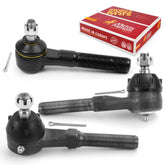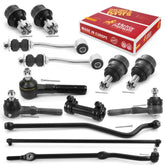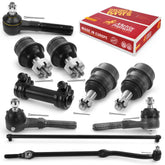Suspension systems are critical for managing the interaction between a vehicle's tires and the road surface. They are vital for ensuring a comfortable, stable, and safe ride while driving. Adjustable and fixed suspension systems are two distinct approaches to designing suspension systems, each with its advantages and disadvantages. An adjustable suspension system allows the driver or operator to modify aspects of the suspension's behavior, either manually or electronically, depending on the sophistication of the system. On the other hand, fixed suspension systems have set characteristics that cannot be adjusted by the driver. While fixed systems lack adaptability, they are generally reliable and well-suited for everyday driving scenarios. When choosing between adjustable and fixed suspension systems, it is important to consider the specific needs of the vehicle and driver.
Adjustable Suspension Systems:
Customization and Adaptability:
Pros: Adjustable suspension systems allow drivers to tailor the vehicle's characteristics to their preferences and driving conditions. This customization can lead to better performance, handling, and comfort.
Cons: The need for driver intervention and adjustments can be inconvenient for some drivers, especially if they are not familiar with suspension tuning.
Performance Enhancement:
Pros: Adjustable systems can enhance performance by allowing drivers to optimize factors like ride height, damping, and spring stiffness. This is especially beneficial for enthusiasts, sports cars, and performance-oriented vehicles.
Cons: Incorrect adjustments can lead to imbalanced handling or reduced stability, potentially compromising safety.
Driving Modes:
Pros: Many adjustable systems are integrated into driving modes, offering convenience for switching between different driving conditions (e.g., sport, comfort, eco).
Cons: The complexity of multiple settings might be overwhelming for some drivers, and not all driving modes might suit every situation.
High-Performance Vehicles:
Pros: Adjustable suspensions are often preferred in high-performance cars for their ability to fine-tune handling characteristics and adapt to different track conditions.
Cons: These systems can increase the cost and maintenance requirements of a vehicle.
Fixed Suspension Systems:
Simplicity and Reliability:
Pros: Fixed suspension systems are simpler in design and operation, resulting in fewer potential points of failure. They are generally more reliable and cost-effective in the long run.
Cons: Fixed suspensions might not provide the same level of customization as adjustable systems.
Ease of Use:
Pros: Fixed suspensions require minimal driver intervention and are suitable for everyday driving scenarios. Drivers do not need to worry about adjusting settings for different conditions.
Cons: The one-size-fits-all approach might not cater to all drivers' preferences and might not optimize performance in specific situations.
Maintenance and Longevity:
Pros: Fixed systems often have fewer components to maintain and replace compared to adjustable systems. This can lead to lower maintenance costs and longer-lasting components.
Cons: Fixed suspensions might not perform optimally in all scenarios, as they are designed with a compromise between comfort and handling.
Mass-Market Vehicles:
Pros: Fixed suspensions are commonly used in mass-market vehicles due to their cost-effectiveness and ability to provide a balanced ride for a wide range of driving conditions.
Cons: Enthusiasts and drivers seeking specialized performance might find fixed suspensions limiting.
Choosing Between Adjustable and Fixed Suspension:
The choice between adjustable and fixed suspension depends on the vehicle's intended use, the driver's preferences, and the overall engineering goals. High-performance vehicles, off-road trucks, and luxury cars often feature adjustable suspension systems to allow drivers to tailor the driving experience to their liking. On the other hand, many mass-market vehicles rely on fixed suspension systems that strike a balance between comfort and handling without the need for driver intervention.
In summary, adjustable suspension systems offer greater customization and adaptability, while fixed suspension systems provide a reliable and cost-effective solution for a wide range of driving scenarios. Doesn’t matter which suspension system you use; Metrix Premium Chassis Parts is the best place you find your vehicle’s aftermarket part needs at the best value.









